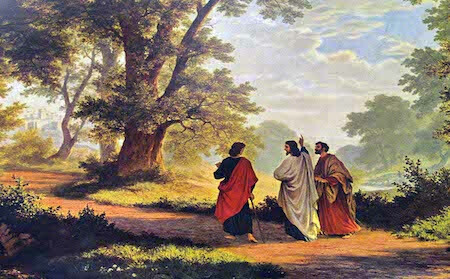Getting Ready for Sunday: April, 30

I once worked with a youth minister who told me that the experience he treasures most in ministry is watching the light bulb come on for a student for the first time. It’s not often that we get to experience that moment, but it is energizing when we do. Perhaps one reason is because we remember when it happened to us—that moment when we were first awakened to seeing what Christ had been doing in our lives all along.
That sort of awakening is what we read in Luke’s Gospel. As the two men walked the dusty road to Emmaus, a traveler came alongside them and talked to them. As a backpacker, I have had that experience many times. It is common courtesy to talk to other hikers when you see them on the trail—something about encouraging one another in the back country, I suppose. Sometimes the conversations are interesting, and sometimes they are merely small talk. But on very rare occasion has a conversation with another hiker connected with me on a deep level.
Jesus’ interpretation of the Scriptures for these two men does just that. They had been his followers, and their world had been shaken by the crucifixion, and then shaken again by the tale they had heard of an empty tomb. Jesus’ words to them are bold and lack encouragement, but they are certainly characteristic of his wisdom: “Oh, how foolish you are, and how slow of heart to believe all that the prophets have declared,” and Luke continues, “Then beginning with Moses and all the prophets, he interpreted to them the things about himself in all the scriptures.”
The story reads as if they talked together all day, or perhaps, Jesus talked and they listened. I imagine that it was familiar to them, like sitting at the feet of their teacher as they had just a week earlier. It was probably a conversation that made the time pass quickly. And by the time they reached Emmaus, they were hanging on his every word. They did not want him to go on, and so they begged him to stay. And at the table, “He took bread, blessed and broke it, and gave it to them,” and the light bulb came on, and he vanished from their sight.
Every one of us has a deep longing in our souls, a light bulb waiting to be lit. And like the resurrected Christ walking alongside these two men on their way to Emmaus, God is constantly calling us into deeper relationship with him—a relationship that will fulfill that longing and spark that lightbulb. The disciples on the road, after recognizing their encounter with Christ, exclaimed, “Were not our hearts burning within us while he was talking to us?”
He is, indeed, talking to each of us on the way to wherever we are going. But often, we do not stop to listen. On the trail, I see talking with other hikers as a necessary burden. I fear we sometimes view our faith like that also. And yet, in reality, it is the thing that speaks to our deepest longing—that speaks to our desire for Christ. Worship is, for us, one way to be sure we are listening with regularity. Other disciplines, such as daily Scripture reading and prayer, help us to hear him also. Stop and take the time to listen, and he will awaken you again and again, and like the disciples on the road to Emmaus, he will pull you into deeper relationship with him.


